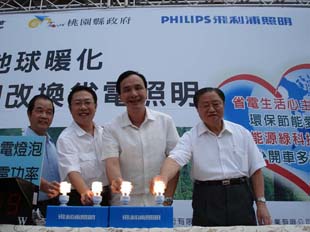Taoyuan County Launches Energy-Saving-Lamp Campaign
2008/04/07 | By Ken LiuLast September the government of Taoyuan County in northern Taiwan began encouraging its citizens to replace their incandescent bulbs with energy-saving lamps by offering them 20,000 free compact fluorescent lamps in collaboration with Philips Lighting Taiwan, Delta Electronics, and major retailers.
The campaign is part of the county government's effort to wake its people up to the severity of global warming. County Magistrate Eric Chu has instructed the chiefs of his government units to watch An Inconvenient Truth, the film made by former United States Vice President Al Gore. Chu himself has seen the Academy Award winner twice.
"I'm pretty impressed by the efforts of the Australian government to inspire the use of energy-conserving lamps as a means of dealing with global-warming and energy-depletion issues," Chu comments. He traveled to Australia early last year to observe its efforts to reduce carbon-dioxide emissions.

(The Australian government has announced that it will start phasing out the use of incandescent bulbs in 2010. The European Union will take a similar step in 2009, with Canada and California following in 2012.)
Citing statistics from the government-owned Taiwan Power Co., Chu notes that a 60-watt incandescent bulb is priced at only NT$20 or so, while an 11-watt energy-saving lamp costs NT$130; the latter, however, saves 24.5 kilowatt-hours or about NT$89 if it is burned 500 hours in a month. This will recoup the cost in less than two months; furthermore, the energy-saving bulb will last five times as long as an incandescent lamp while consuming just one-fifth the electricity.
Since his county consumes 24.8 billion kilowatt-hours of electricity costing as much as NT$50 billion (US$1.56 billion) a year, Chu estimates that it could save around NT$1.6 billion (US$50 million) annually if it could reduce the electricity used for lighting by 20%.
The Taoyuan County Cultural Affairs Bureau has already installed energy-saving lamps in all of its light fixtures, and the county government has installed them on the first and second floors of its 17-story main building. The installation will continue expanding, Chu says.
The magistrate has noticed that energy-saving lamps are needed for outdoor public-works projects, and plans to install solar- or wind-powered streetlights.
Pushing Production Up and Prices Down
In addition to Philips Lighting, the county government also plans to work with local lighting producer China Electrical Manufacturing Co. in carrying out its energy-saving projects. Chu believes that the prices of energy-saving lamps will come down as demand boosts production upward, encouraging the use of more of the lamps in public facilities.
As part of the county government's effort to encourage the development of eco-friendly products, it recently organized a miniature exhibition (with 50 items) of government-approved ecological products in its headquarters building.
Around 30% of Taiwan's approved ecological products, Chu claims, are made in his county, including energy-saving refrigerators, air conditioners, motorbikes, cars, water heaters, gas stoves, water-conserving bathroom equipment and washing machines, low-pollution building materials and lacquer, dissolvable materials, recyclable toner cartridges, cartons, plastic pipes, and toxic-free detergents.
The magistrate stresses that people can start conserving energy and improving the ecology by focusing on trifling daily items. "For instance," he explains, "we can refuse to use disposable tableware, and expand the campaign from government organizations and schools into the private sector." He recently invited chefs from the county's only five-star hotel, the Monarch Plaza, to demonstrate cooking with microwave ovens so as to show how to reduce exhaust gases from cooking and retain the delicious flavors of food by avoiding the use of natural gas.
The county chief is also planning to encourage all of the county's 274 filling stations to capture leaked petroleum gas, and 47 have so far been awarded for their success in doing so.
Chu suggests that Taiwan's central government should follow the example of some foreign governments by setting a deadline for the phasing out of incandescent bulbs in favor of energy-saving lamps all over the island. "Our county has taken the first step in this direction," he says, "and we'll continue the effort by working up to energy-saving plans for air conditioners."




